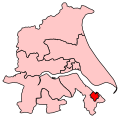Great Grimsby (UK Parliament constituency)
| Great Grimsby | |
|---|---|
|
Borough constituency for the House of Commons |
|

Boundary of Great Grimsby in North East Lincolnshire.
|
|

Location of North East Lincolnshire within England.
|
|
| County | Lincolnshire |
| Electorate | 61,929 (December 2010) |
| Current constituency | |
| Created | 1295 |
| Member of parliament | Melanie Onn (Labour) |
| Number of members | One (Two until 1832) |
| Overlaps | |
| European Parliament constituency | Yorkshire and the Humber |
Great Grimsby is a constituency in North East Lincolnshire represented in the House of Commons of the Parliament of the United Kingdom since May 2015 by Melanie Onn of the Labour Party.
The present constituency follows the boundaries of the old Borough of Great Grimsby, which was abolished when the former county of Humberside was divided into four unitary authorities in 1996. From the 2010 general election new boundaries took effect, but the Boundary Commission's review led only to minimal changes, aligning the constituency boundaries with present ward boundaries so the seat still has electoral wards:
The constituency has been represented since the first House of Commons was assembled in the Model Parliament of 1295, and it elected two MPs until 1832. Great Grimsby was established as a parliamentary borough in 1295, sending two burgesses, and has been continuously represented ever since. The town of Grimsby in Lincolnshire, a market town, fishing port and seaport.
Freemen of the town had the right to vote, provided they were resident and paying scot and lot; in 1831 this amounted to just under 400 voters. The town corporation bestowed this status, as today, rarely on those bringing acclaim to the place, but it was routinely acquired through apprenticeship in the guilds and by inheritance; in Great Grimsby, unusually, the husband of a freeman's daughter or widow acquired the freedom.
In 1831, when the Reform Bill was being discussed in Parliament, the wives and daughters of the Great Grimsby freemen petitioned the House of Lords to retain their rights to pass on the vote to their future husbands and children. However, their concern to retain these rights may not have been rooted in any their family desiring to help choose the borough's MPs as a vote in Great Grimsby was a valuable commodity in a more mercenary sense, and the contemporary polemicist Oldfield considered that "This borough stands second to none in the history of corruption." At the start of the 18th century it was noted that Grimsby's "freemen did enter into treaties with several gentlemen in London, for sale of the choice of burgess to such as would give the most money". In 1701, the House of Commons overturned the election of one of Great Grimsby's MPs, William Cotesworth, for bribery and sent him to the Tower of London and temporarily suspended the borough's right to representation. Almost every election in Great Grimsby at this period was followed by a petition from defeated candidates alleging bribery, although that of 1701 seems to have been the only one which was acted upon.
...
Wikipedia
